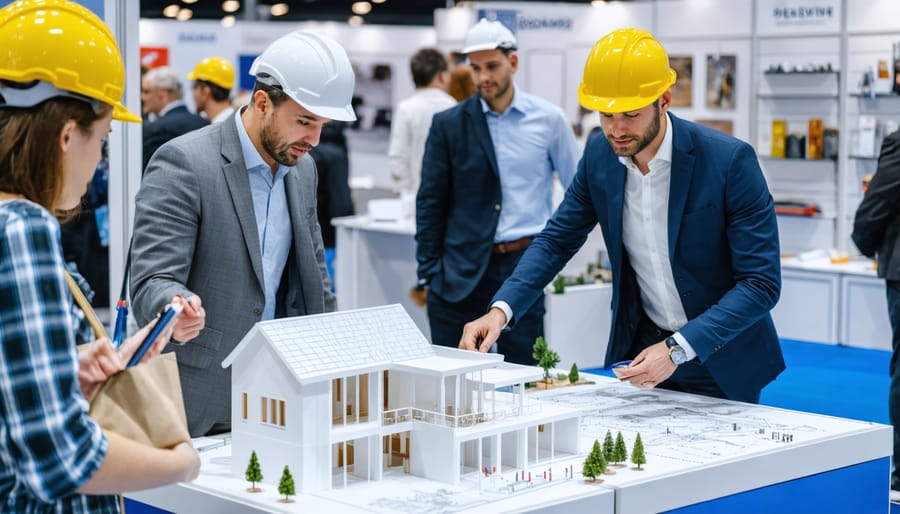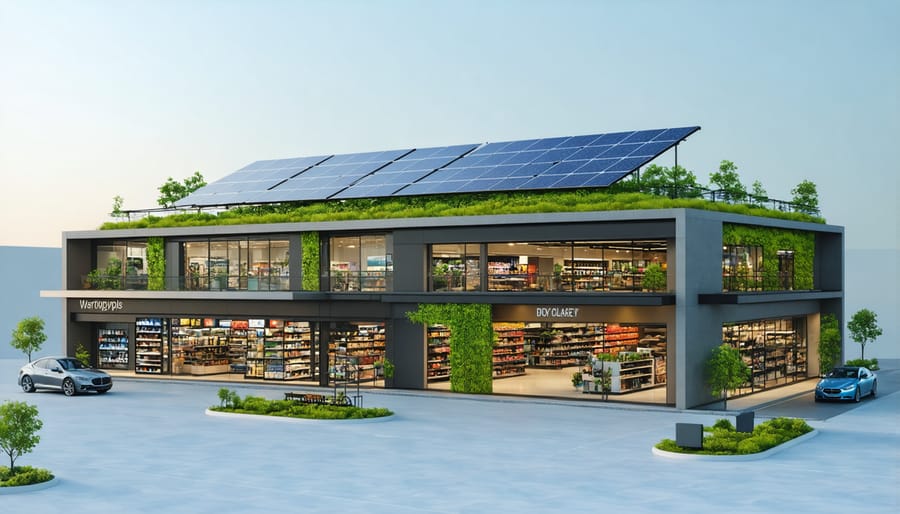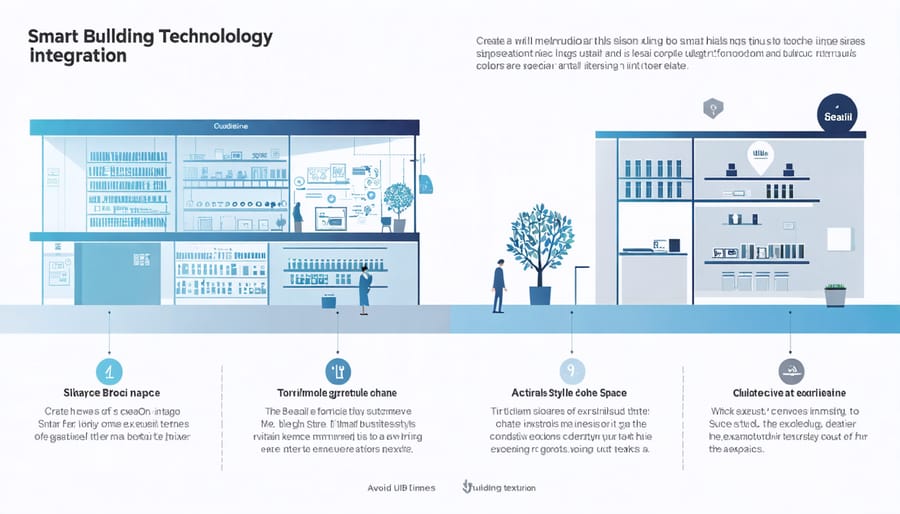Retail industry associations stand as the cornerstone of modern retail development, wielding significant influence over construction standards, sustainability practices, and technological innovation in commercial spaces. These powerful organizations collectively represent over $3.9 trillion in annual retail sales, establishing crucial building standards and compliance frameworks that shape how retail spaces are designed, constructed, and operated. From the National Retail Federation’s pioneering research on smart building technologies to the Shopping Center Council’s groundbreaking guidelines for sustainable retail construction, these associations drive the evolution of retail infrastructure while providing essential resources for construction professionals. Their impact extends beyond traditional retail, influencing mixed-use developments, logistics facilities, and digital integration requirements that define modern retail construction projects. Construction professionals partnering with these associations gain privileged access to emerging trends, regulatory insights, and innovative building solutions that are reshaping the retail landscape.
The Strategic Role of Retail Associations in Construction
Standards Development and Implementation
Retail industry associations play a crucial role in developing and maintaining construction standards that ensure safety, efficiency, and consistency across retail spaces. These organizations collaborate with architects, engineers, and construction professionals to establish comprehensive guidelines that address unique retail requirements, from storefront designs to customer flow patterns.
The standard development process typically involves multiple stakeholders and follows a systematic approach. Technical committees comprising industry experts evaluate existing standards, conduct research, and incorporate emerging technologies and sustainability practices. These committees regularly review and update standards to reflect evolving building codes, accessibility requirements, and environmental regulations.
Key areas covered by retail construction standards include lighting specifications, HVAC requirements, floor loading capacities, and emergency systems. Associations also provide detailed guidelines for specialized retail environments such as food service areas, fitting rooms, and display installations.
Implementation support is offered through certification programs, technical documentation, and professional training. Many associations maintain databases of approved materials and systems, helping construction teams ensure compliance while streamlining the project planning process. Regular audits and inspections help maintain adherence to these standards across the retail construction sector.
Regulatory Advocacy and Compliance
Retail industry associations play a pivotal role in regulatory advocacy and compliance within the construction sector. These organizations actively participate in code development processes, working closely with regulatory bodies to ensure building standards reflect both safety requirements and practical industry considerations. Through dedicated committees and task forces, associations provide expert testimony during code hearings and submit detailed proposals for code modifications.
These organizations serve as vital intermediaries between regulatory agencies and their members, translating complex requirements into actionable guidance. They regularly develop compliance toolkits, conduct training sessions, and provide technical assistance to help members navigate evolving building codes and standards. Many associations maintain dedicated technical support hotlines and offer peer-to-peer networks where members can share compliance strategies and best practices.
Additionally, associations frequently conduct compliance audits and assessments for their members, helping identify potential issues before they become regulatory violations. They also track emerging regulations and provide early warnings about upcoming changes, allowing members to plan and adjust their construction practices proactively. This proactive approach helps maintain high industry standards while reducing compliance-related delays and costs.
Key Industry Events Driving Innovation
Annual Conferences and Trade Shows
The retail construction industry features several influential annual conferences and trade shows that serve as essential platforms for networking, innovation showcase, and knowledge exchange. The National Retail Federation’s Big Show, held annually in New York City, remains the largest retail industry event, featuring dedicated tracks for store planning, construction, and facility management. This event typically draws over 40,000 attendees and showcases the latest developments in retail construction technology and sustainable building practices.
ICSC RECon, hosted by the International Council of Shopping Centers, represents another cornerstone event focusing specifically on retail real estate and construction. The conference presents cutting-edge design concepts, construction methodologies, and innovative materials through interactive demonstrations and expert-led sessions.
RetailX, combining three major retail industry shows, offers comprehensive coverage of store construction and renovation trends, with particular emphasis on integrating digital technologies into physical retail spaces. The event features specialized pavilions dedicated to construction materials, fixtures, and sustainable building solutions.
The Global Retail Real Estate Convention provides an international perspective on retail construction, bringing together developers, contractors, and retail brands from over 100 countries. This event particularly emphasizes sustainable construction practices and adaptive reuse strategies for retail spaces.
These gatherings not only facilitate business connections but also serve as platforms for introducing new construction standards and celebrating innovative retail development projects through various industry awards and recognition programs.

Educational Seminars and Workshops
Retail industry associations provide extensive educational opportunities through seminars and workshops designed specifically for construction professionals working in retail environments. These professional development programs cover crucial topics such as store layout optimization, sustainable building practices, and retail-specific safety regulations.
Industry experts lead intensive workshops focusing on emerging construction technologies, materials innovation, and advanced project management methodologies tailored to retail environments. Participants gain hands-on experience with the latest building information modeling (BIM) software, energy-efficient systems, and smart building technologies increasingly demanded in modern retail construction.
Regular certification programs ensure construction professionals stay current with retail-specific building codes, accessibility requirements, and environmental standards. These programs often include specialized tracks for different roles, from project managers to site supervisors, allowing participants to develop expertise in their specific areas of responsibility.
Notable annual events include the Retail Construction Summit and the Store Planning & Design Workshop Series, where professionals can network while learning about cutting-edge construction techniques and materials. Case study presentations from successful retail construction projects provide valuable insights into practical problem-solving and innovation implementation.
The associations also facilitate mentor-mentee relationships, connecting experienced retail construction professionals with emerging talent. This knowledge transfer ensures the continuation of best practices and fosters innovation in retail construction methodologies.
Sustainable Building Initiatives

Green Building Certification Programs
Leading retail industry associations have established comprehensive green building certification programs to promote sustainable design practices across the sector. The LEED Retail certification program, developed in collaboration with major retailers and the U.S. Green Building Council, addresses the unique challenges of retail construction projects while ensuring environmental responsibility. This program encompasses criteria for energy efficiency, water conservation, waste reduction, and indoor environmental quality specific to retail facilities.
The Green Globes for Retail Properties certification offers a practical alternative, featuring a streamlined assessment process and continuous improvement methodology. This program particularly appeals to mid-sized retailers seeking cost-effective sustainability solutions. Additionally, the BREEAM In-Use for Retail certification has gained traction internationally, providing retailers with a robust framework for evaluating and enhancing their existing building stock’s environmental performance.
These certification programs typically require third-party verification and offer different certification levels based on achievement. They have become increasingly important as consumers demand greater environmental responsibility from retailers, and municipalities implement stricter building codes. Many associations also provide training resources and technical support to help members navigate the certification process effectively.
Energy Efficiency Standards
Retail industry associations play a crucial role in establishing and promoting energy efficiency standards across the retail sector. These standards typically mandate specific requirements for lighting systems, HVAC equipment, building envelope performance, and refrigeration systems in retail spaces. Major associations collaborate with organizations like ASHRAE and the U.S. Green Building Council to develop comprehensive guidelines that balance operational efficiency with environmental responsibility.
Key requirements often include minimum efficiency ratings for HVAC systems, specifications for LED lighting installations, and thermal performance standards for building materials. For example, modern retail facilities must achieve a minimum energy performance index (EPI) and incorporate smart building management systems for optimal energy usage.
Association guidelines commonly address:
– Maximum allowable power density for lighting systems
– Minimum R-values for insulation materials
– Energy recovery ventilation requirements
– Variable frequency drive implementations
– Building automation system specifications
These standards are regularly updated to reflect technological advancements and evolving environmental regulations. Compliance often results in significant operational cost savings, with many retailers reporting 20-30% reduction in energy consumption after implementing these guidelines. Associations also provide members with implementation resources, technical support, and certification programs to ensure successful adoption of energy-efficient practices.
Technology Integration and Innovation
Digital Infrastructure Requirements
Modern retail facilities require robust digital infrastructure to support evolving consumer experiences and operational efficiencies. Industry associations have established comprehensive standards for implementing advanced construction technologies in retail spaces. These requirements encompass high-capacity network infrastructure, integrated building management systems, and IoT device support.
Key specifications include dedicated telecommunications rooms with proper cooling systems, structured cabling pathways, and redundant power supplies. Retail facilities must accommodate minimum bandwidth requirements of 1Gbps for primary networks and include provisions for future expansion. Building automation systems should integrate HVAC, lighting, security, and energy management through a centralized platform.
Point-of-sale infrastructure demands careful consideration during the construction phase, with requirements for power distribution, network connectivity, and flexible configurations to support various payment technologies. Digital signage infrastructure must be incorporated into architectural designs, including appropriate power supplies, mounting systems, and data connectivity. These standards ensure retail spaces can adapt to emerging technologies while maintaining operational reliability and customer experience excellence.
Smart Building Solutions
Leading retail industry associations have established comprehensive guidelines for implementing smart building solutions in retail environments. These guidelines emphasize the integration of IoT sensors, automated climate control systems, and AI-driven analytics to optimize store operations and enhance customer experience. Key recommendations include the deployment of occupancy monitoring systems, energy management platforms, and predictive maintenance protocols.
Associations advocate for a three-tier approach to smart technology implementation: infrastructure readiness, system integration, and data analytics capability. This framework ensures retailers can effectively manage their facilities while reducing operational costs and environmental impact. Particular emphasis is placed on cybersecurity protocols and data privacy compliance, with associations providing regular updates to address emerging technological challenges.
The guidelines also outline best practices for retrofitting existing retail spaces with smart technologies, including phased implementation strategies and ROI assessment models. Associations recommend establishing cross-functional teams to oversee smart building initiatives, ensuring alignment between facility management, IT infrastructure, and business objectives.

Future Outlook
The retail construction landscape is poised for significant transformation over the next decade, driven by technological advancements, sustainability requirements, and evolving consumer behaviors. Industry associations are already developing new guidelines that emphasize flexible space design, incorporating smart building technologies, and promoting sustainable construction practices.
A key trend emerging is the integration of digital infrastructure requirements into building standards. As retailers increasingly adopt omnichannel strategies, construction standards are evolving to accommodate advanced logistics systems, automated fulfillment centers, and hybrid shopping experiences. Industry experts predict that future retail spaces will require more sophisticated power systems, enhanced connectivity infrastructure, and adaptable architectural designs.
Sustainability is becoming a central focus of updated construction standards. Associations are developing more stringent environmental guidelines, including requirements for energy-efficient systems, sustainable materials, and waste reduction protocols. These standards are expected to align with global environmental initiatives and emerging carbon neutrality goals.
Safety and health considerations, particularly in light of recent global events, are reshaping construction requirements. New standards are incorporating improved ventilation systems, touchless technologies, and spatial designs that can adapt to varying occupancy needs and social distancing requirements when necessary.
Industry associations are also focusing on standardization of modular construction techniques, which allow for faster construction timelines and reduced costs. This approach is expected to become increasingly important as retailers seek to optimize their physical footprint while maintaining flexibility for future modifications.
Looking ahead, retail industry associations will likely place greater emphasis on resilient design principles, ensuring that retail structures can withstand environmental challenges while adapting to rapidly changing market conditions. This includes developing guidelines for converting retail spaces to alternative uses, supporting the trend toward mixed-use developments.
Retail industry associations have fundamentally transformed construction practices through their influential role in setting standards, promoting innovation, and fostering collaboration between stakeholders. Their impact extends beyond mere guidelines, creating lasting changes in how construction professionals approach retail-specific projects.
These associations have successfully bridged the gap between retail operators’ needs and construction industry capabilities, resulting in more efficient project delivery methods and improved building performance. Through comprehensive research initiatives and data sharing, they have helped establish best practices that balance cost-effectiveness with quality construction outcomes.
The implementation of association-developed standards has led to measurable improvements in construction safety, sustainability, and operational efficiency. Construction firms that actively engage with retail associations report better project outcomes, reduced complications, and enhanced client satisfaction. This collaborative approach has proven particularly valuable in addressing emerging challenges such as sustainable building practices and technological integration.
Looking ahead, retail associations will continue to shape construction industry practices through evolving standards and innovative solutions. Their influence on material specifications, design requirements, and construction methodologies will remain crucial as the retail landscape undergoes digital transformation and adapts to changing consumer behaviors.
For construction professionals, maintaining strong relationships with retail industry associations has become essential for staying competitive and delivering projects that meet modern retail requirements. These partnerships will become increasingly important as the industry faces new challenges in sustainability, technology integration, and changing consumer expectations.

